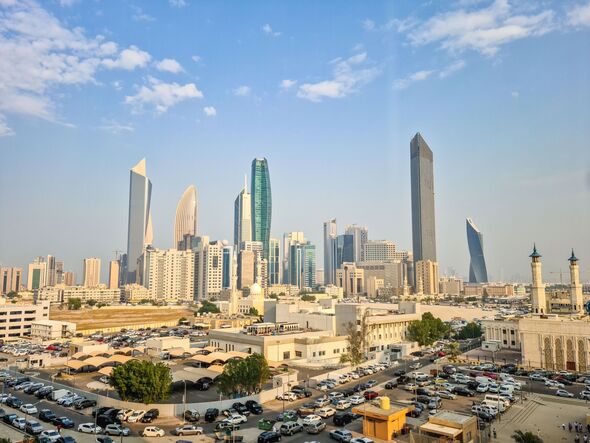Once known as the “Marseilles of the Gulf”, Kuwait City had a thriving fishing industry and was an attractive destination for tourists. Today, however, visiting the country’s capital is a completely different experience.
Located at the heart of the country on the south shore of Kuwait Bay on the Arabian gulf, the city is the political, cultural and economic centre of the emirate. The country is also home to the seventh-largest oil reserve in the world, allowing it to amass an impressive fortune through its exploitation over the past century.
On July 21, 2016, the Mitribah weather station in northern Kuwait registered a temperature of 54C – the third-highest reading in the world, ever. The highest was officially documented in Death Valley, California, in July 1913, when 56.7C was recorded.
Gauges in Kuwait City also breached 50C for 19 days in 2021.
With such a temperature, the 40C or above temperatures recorded during this summer’s European heatwave in countries such as Spain, or even last year’s blistering Cerberus Heatwave would hardly have mustered a flinch from a resident in the Middle Eastern country.
At about 6,880 square miles, smaller than Wales, Kuwait is home to roughly 4.4 million people, with three million inhabitants (more than 70 percent) living in the capital as of 2018.
As the country gets hotter at a faster rate than the global average, climate scientists now predict temperatures there will be up 5.5C by the end of the century relative to the 2000s.
What’s more, annual rainfall has been dropping in the already arid country, with the frequency and intensity of dust storms increasing as a result.
The concrete and asphalt capital is becoming unlivable, with date merchant Abdullah Ashkanani telling AFP that the country’s excessive energy consumption had “brought this heat to Kuwait.”
Reports have claimed that birds have dropped dead from the sky and seahorses have boiled in the bay, with pigeons also huddling together in the shade.
What is most concerning for its residents, however, is the impact the heat has on the human body. Halfway to water’s boiling point and 13C above body temperature, beyond being unhealthy, 50C is dangerous to humans as well. Prolonged exposure can result in heat exhaustion, cardiovascular problems and even death.
Research published by the Institute of Physics claims that by the end of the century, climate change could increase the number of heat-related deaths by 5.1 percent to 11.7 percent across the whole population, but by up to 15 percent for non-Kuwaitis including migrant workers.
This year, for the first time, the Kuwaiti government has issued an edict allowing funerals to be conducted at night.
The challenging environment has led to infrastructure projects which are unlike anywhere else in the world. For example, there is now an entire indoor shopping street, lined with palm trees and European-style boutiques, that shelters shoppers from the brutal heat.
According to a 2020 study, two-thirds (67 percent) of total electricity consumption in residences is thought to come from air conditioning units running 24 hours, seven days a week. An indoor shopping mall on the streets of the city even have air conditioning.
But while nearby countries such as Saudi Arabia and the UAE have made net-zero pledges for the next decades, Kuwait’s COP26 promise was to curtail emissions by just 7.4 percent by 2035, a meagre figure in comparison.
Energy demand will triple by 2030, according to Kuwait’s Ministry of Electricity and Water, with an expected rise in indoor cooling usage likely to blame. Up to 95 percent of the country’s electricity costs are subsidised by the government, so individuals have little incentive to cut back.
Salman Zafar wrote for EcoMENA that: “Kuwait could be potentially facing serious impacts of global warming in the form of floods, droughts, depletion of aquifers, inundation of coastal areas, frequent sandstorms, loss of biodiversity, significant damage to ecosystem, threat to agricultural production and outbreak of diseases.”

Düşük kaliteli backlink Google SEO, işimizi büyütmek için mükemmel bir araç. https://royalelektrik.com//beylikduzu-elektrikci/